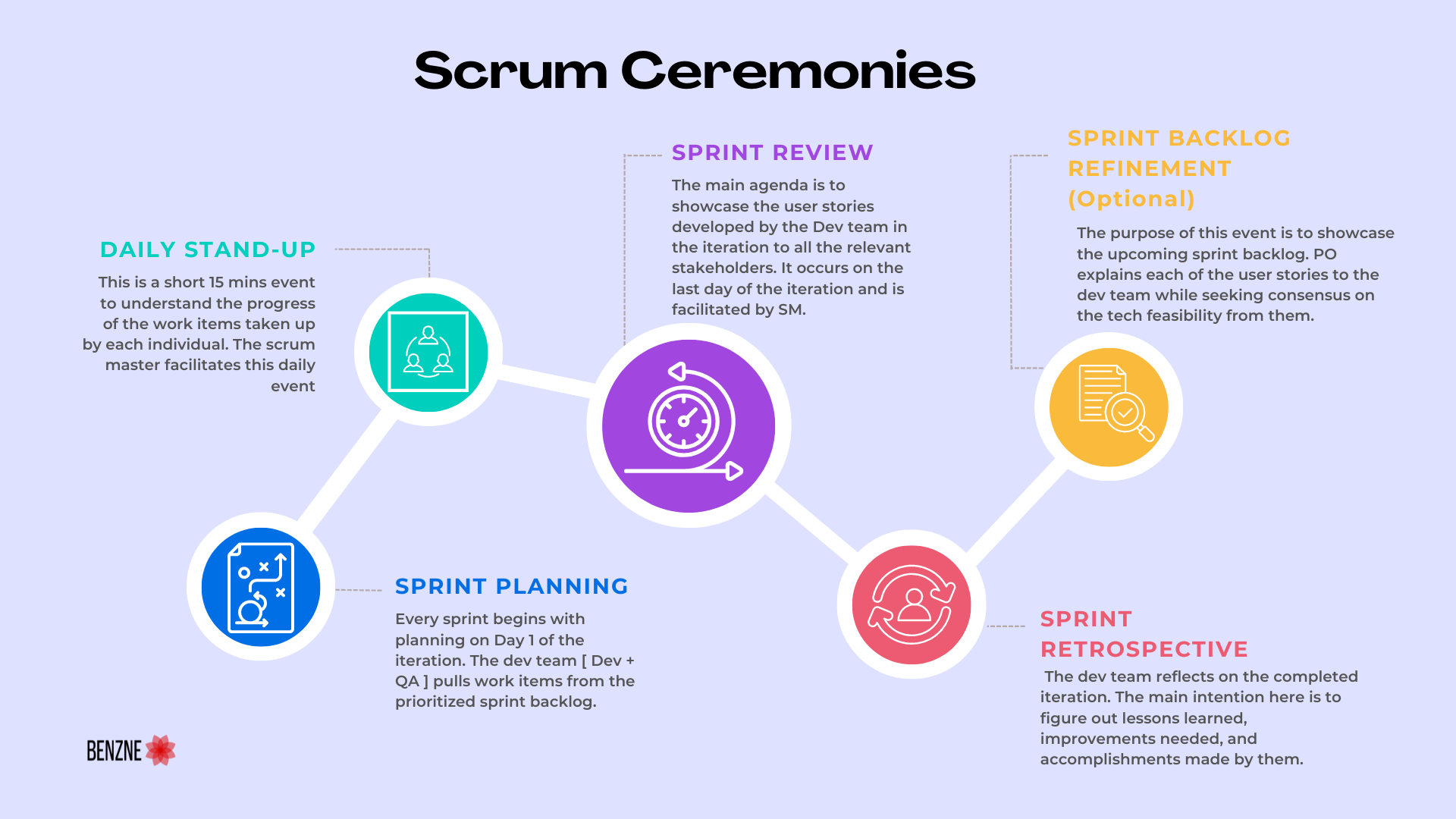Scrum framework is based on the principles or pillars of Focus, Commitment, Courage, Openness, and Respect. These are ideally embedded in various ceremonies of each sprint – namely the Sprint planning, Daily stand-up, Sprint Review, Retrospective, and Backlog refinement.
Each one of these events or ceremonies has a purpose to meet.
The 5 ceremonies of the Scrum framework are :

- Sprint planning
- Daily Standup
- Sprint Review
- Sprint Retrospective
- Sprint Backlog Refinement ( Optional)
Let’s elaborate on each of these events.
Every sprint begins with planning on Day 1 of the iteration. The dev team [ Dev + QA ] pulls work items from the prioritized sprint backlog. Now, these work items are aligned with the sprint goals. The work items or user stories are prioritized and ordered as a prerequisite by the product owner [ PO]. PO also sets the sprint goals. The dev team identifies their capacity and assigns user stories to themselves accordingly. Once the dev team attains more clarity on the user stories or work terms, they could reestimate the size of the user stories. By the end of this event, which can last up to four to five hours, the dev team showcases their confidence and commits to the sprint. Thereafter, the Scrum Master starts the execution of the sprint.
2. Daily Standup Meeting
This is a short 15 mins event to understand the progress of the work items taken up by each individual. The scrum master facilitates this daily event. The purpose of the daily standup is essentially threefold – to check if the team is trending towards the committed sprint goals, to understand the work that remains to be done, and to flag off the impediments or early warning indicators identified by the team. The PO may participate in this event to answer any queries the Dev team has. A crucial point to stress is the quick action to be taken by the SM to help the team reach their goals.
3. Sprint Review
The main agenda of this ceremony is to showcase the committed functionalities (user stories) developed by the Dev team in the iteration to all the relevant stakeholders. The Scrum Master facilitates this event and occurs on the last day of the iteration. Here the Dev team demonstrates the user stories and gets a sign-off from the Product Owner. The other agenda is also to invite any feedback on the built functionalities. The participants are the Dev team, product team, users (if applicable), sponsor, business, etc.
This event is the last one of the iterations. In this ceremony, the dev team reflects on the completed iteration. The main intention here is to figure out lessons learned, improvements needed, and accomplishments made by them. These are captured as actionable lessons for future sprints to incorporate lessons and avoid any pitfalls in the current and future sprints based on past experiences. Here values of Scrum, “ courage” and “ openness ”, can be observed. The participants are Dev Team members only, while PO may be optional.
5. Backlog Refinement ( Optional)
The key focus area in Scrum is to have future visibility and clarity of work to be taken in upcoming sprints. Once the dev team starts working on the planned user stories in the planned iteration, the product owner plans the next sprint backlog by prioritizing the user stories. Mid-week, a backlog refinement event is held for the Dev team by the PO. The purpose of this event is to showcase the upcoming sprint backlog. PO explains each of the user stories to the dev team while seeking consensus on the tech feasibility from them. Dev team estimates the size of user stories in story points or days as they get clarity on how the stories have to be implemented. Thus in this event, the Dev team and PO arrange the user stories in the subsequent Sprint backlog to be implemented in the upcoming sprint.
The events mentioned above form the backbone of a scrum framework.
For more insight, blogs and articles on Scrum, Agile, Project Management, Kanban & Design Thinking, please visit https://benzne.com/blogs/. Benzne is an agile consulting organization with a key focus of time-bound, business outcome-driven agile transformations.





